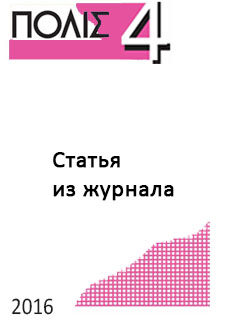Online shop of "Polis. Political Studies" Journal
We in the world, the world in us
Buldakov V.P. Russian Multi-party System: Illusions of the Past, the Chimera of Contemporaneity. – Polis. Political Studies. 2016. No 4. P. 100-114.
Free!
The author refutes the idea that progress of multiparty system in Russia equaled the development of democratization. On the contrary, origin of multiparty system in Russia in the late XIX – early XX century was the symptom of fragmentation of society, which, in turn, indicated the approaching system crisis. Russian political parties grew from above, not from below; they embodied the processes of ideological self-expression of intelligentsia, rather than awakening of basic class forces. The fact that political parties originally emerged on the outskirts of the Empire (firstly on the left, then on the right side of the political spectrum) is another characteristic of the process of political party building as reflection of the approaching disintegration of Empire and division of society. It also indicates utter weakness of liberal center parties. All of this was fully confirmed in 1917. Events of the late XX century reflect the cultural and genetic nature of the continuing archaic character of the mass political culture in the country. The basis of this culture, namely the paternalistic and hierarchic patterns of mass behavior, remains unchanged. The existing political parties, as a rule, merely mimic the presence of a normal political life in the country, contributing to consolidation of neopaternalistic relations in politics and archaic mass consciousness. The author underlines the necessity to study the real subject of Russian political history – the very “dark masses”, with which the elite still cannot find a common language.
 English
English Русский
Русский

Reviews
There are no reviews yet.